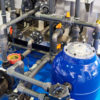In order to keep your swimming pool in the best condition for a healthy swimming environment, pool maintenance is a necessary fact of life. Cleaning may not be your favorite chore; Pool Troopers can give you some ideas about maintaining your backyard pool and is here to help.
The dream of having a swimming pool right in the back of your house, available for family, friends, and entertaining can be made easier with some basic tips. Some cleaning and monitoring may be done daily, weekly, or seasonally.
Brushing, Skimming, and Vacuuming the Pool
Skimming to pool surface should be done daily to keep the pool pristine and clean. The bottom of your pool can be vacuumed manually, or it can be done for you daily with a robotic cleaner or a suction or pressure side automatic pool cleaner.
The sides of the pool should be brushed in order to avoid a buildup of algae. Not needed daily, you can do the scrubbing weekly to every other week. A good pool brush gets rid of any growths you might spot, and the microscopic growth you don’t see.
Clean the Skimmer Basket and Pump Basket
The purpose of your pool’s Baskets is to remove debris, dirt, leaves, and possibly little toys that have infiltrated the pool. Once a week is fine for this cleaning, which can be done by:
Skimmer Basket
- Turning off the Pool’s power
- Removing the skimmer lid on the pool deck
- Lifting out basket- being careful of potential spiders, reptiles, or snakes
- Removing debris with a hose or your hands
- Replacing it all
Pump Basket
- Remove the pressure from the system at the Pressure Relief Valve on the filter- reclose the Air
- Relief Valve
- Open the Pump Lid
- Remove the pump basket and clean it out using a pressure hose
- Carefully replace the pump basket and the pump lid O-ring making sure it is clean and flexible
- Tighten the lid
- Restart the system by turning on the power and once the pump catches prime, open the Air Relief Valve on the filter to remove the air from the system
- Once water shoots out from the Air Relief Valve close it
Backwashing and Cleaning Your Filter and Run Time
Backwash or clean your filter per manufacturer’s instructions at least once per month. For some filters that may be undersized or if the pool is heavily used it may be necessary to clean the filter more frequently. Set the pump on a timer; it should run at least 8 hours a day, and it may need to run longer in the heat of the swim season. Runtime is based on all the pool water going through the filter at least 2 times per day- called “Turnover”.
Test Your Pool Weekly
According to the Center for Disease Control, different chemicals need to be considered when it comes to keeping your pool clean. They are:
- Chlorine – measures the presence of chemicals that sanitize and disinfect\
- pH- The measurement of a waters Acidity or Basic nature
- Alkalinity- A measurement of a solutions ability to resist drastic changes to pH
- Calcium harness – The amount of dissolved calcium in a solution
- Cyanuric acid – protects chlorine from degrading due to ultraviolet rays from the sun
- Total dissolved solids – inorganic salts, such as calcium, magnesium, potassium, sodium, chlorides, bicarbonates, and sulfates dissolved in the water
Using test strips, there is a preferred timetable for testing chemicals. Recommended are:
- Chlorine- test two to three times a week, your test should include Total Chlorine and Free Chlorine
- PH- test two to three times a week
- Alkalinity – once a week, once a month at least
- Total dissolved solids – once a week, once a month at least
- Cyanuric acid – twice a season
- Calcium hardness – twice a season
If you are purchasing the chlorinating compounds, you can find them in several forms; it is available as a liquid, in tablets, or as a granule.
Shock Your Pool
Shocking the pool is crucial if you have tested the water and the Free Chlorine is less than the Total Chlorine. This indicates the presence of combined chlorines which cause irritation to swimmers and unsavory pool water. Shocking helps to reduce eye irritation and odors from the combined chlorine. It also helps keep the pool clear. If you’ve had a social gathering at the pool and notice the water is cloudy, it may be time to shock the pool.
Pool Chemical Safety
If you are doing the pool maintenance yourself, there are certain precautions that you should follow to keep yourself and family members safe. Remember to:
- Always wear rubber gloves when handling chemicals
- Wash hands immediately when finished and wash any part of your skin pool chemicals came in contact with
- Follow the manufacturer’s directions
- Never pour unused chemicals down the drain. Do not throw in any garbage
- Do not light fires when using chemicals
- Always add chemicals to water, not water to chemicals
- Never mix chemicals- always add them separately to the pool water
These are some pointers to help with the cleaning and maintenance of your water and pool environment. Keeping bacteria levels low as well as keeping debris from the pool is very important. The right chemicals and service can make your pool a fun place to be. Whether you call Pool Troopers for service or are going to handle it yourself, pool maintenance and cleaning is incredibly vital to everyone’s health and enjoyment. Give us a call to find out more.



